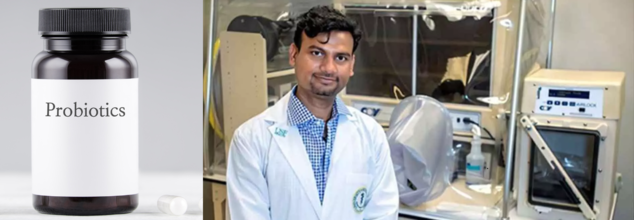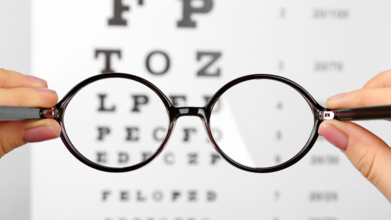- Health Conditions A-Z
- Health & Wellness
- Nutrition
- Fitness
- Health News
- Ayurveda
- Videos
- Medicine A-Z
- Parenting
- Web Stories
This Indian-Origin Researcher Developed A Probiotic Cocktail To Prevent Dementia

Credits: Canva
As per the World Health Organization (WHO), 57 million people had dementia worldwide in 2021. the Alzheimer's Disease International (ADI) predicted that this number will almost double every 20 years and reach 78 million in 2030. However, there is hope. An Indian origin researcher in the US developed a probiotic cocktail that will help prevent dementia.
What Is Dementia?
As per Alzheimer's Association, dementia is a general term for loss of memory, language, problem-solving and other thinking abilities that are severe enough to interfere with daily life. Alzheimer's is the most common cause of dementia.
It is an umbrella term for loss of memory and other thinking abilities that are severe enough to interfere with daily life. There are various types of dementia, including Alzheimer's, Vascular, Lewy body, Frontotemporal, other includes Huntington's and mixed dementia.
What Is Anti-Dementia Probiotic Cocktail?
The cocktail is developed by Hariom Yadav from the University of South Florida. It is one of a kind of blend of probiotics that can positively impact the microbiome.
Hariom Yadav, director of the USF Health Center for Microbiome Research and associate professor of Neurosurgery and Brain Repair at the USF Health Morsani College of Medicine, is leading the charge. As senior author of two recent studies, his work centers on how gut health affects the brain and cognitive function.
The microbiome is the unseen community of microorganisms that live by the trillions in a person's gut. This probiotic cocktail works by positively influencing the microbiome—the vast, invisible community of trillions of microorganisms living in our gut.
When the Gut Goes Wrong
In a healthy person, these microorganisms coexist in balance. However, when harmful bacteria and viruses disrupt this harmony, it can trigger systemic issues throughout the body. Research now links such disruptions to long-term brain conditions, including dementia and Alzheimer’s disease. This is particularly alarming as dementia cases are expected to double, reaching nearly a million new diagnoses annually by 2060.
Probiotic Cocktail Shows Promise
In a study published in Scientific Reports in January, Yadav’s team tested the cocktail, which combines multiple strains of beneficial gut bacteria. Unlike current Alzheimer’s treatments that focus solely on brain biology, this cocktail offers a new direction—targeting the gut to protect the brain.
Testing the Cocktail on Mice
To evaluate its effects, mice were given the probiotic blend in their drinking water for 16 weeks. They then completed a "water maze" test, which challenged them to find a hidden underwater platform using visual cues. Mice that consumed the cocktail consistently outperformed those that didn’t.
Positive Results in Brain Health
The researchers observed that the probiotic mixture reduced the accumulation of harmful brain proteins linked to plaque formation. It also appeared to decrease brain inflammation and maintain the integrity of the blood-brain barrier, preventing dangerous microorganisms from leaking into the brain.
A Synergistic Approach to Gut Health
“We actually developed this cocktail a few years back,” said Yadav. “Normally, people look at single-strain probiotics. But we discovered that when used together as a consortia, they have more power to shift the microbiome from harmful to beneficial.”
Can Wearing Black Undergarments Cause Breast Cancer? Expert Busts Breast Cancer-Related Myths

Credits: Canva
October is the Breast Cancer Awareness Month. Each year, the World Health Organization (WHO) observes this month to spread awareness on breast cancer and the month is also globally observed. This year, the theme is 'Every Story is Unique, Every Journey Matters'. The aim of this theme is to make more people understand that while community support is important, not everyone's journey can be the same. Each breast cancer diagnosis is personal.
Breast Cancer Statistics
Breast cancer is the most commonly diagnosed cancer among women worldwide. In 2022, approximately 2.3 million women were diagnosed and another 670,000 died from the disease, notes WHO.
WHO also notes that while the 5-year survival rates in high-income countries exceeds 90%, the figures drop to 66% in India and 40% in South Africa. These disparities are driven by unequal access to early detection, timely diagnosis and effective treatment. If the current trend continues, the incidence and mortality are projected to rise by 40% by 2050 hence the need for urgent and coordinated action. Indeed, where a woman lives should not determine whether she survives.
Established in 2021, the WHO Global Breast Cancer Initiative together with partners is working with countries to reduce breast cancer mortality by strengthening health systems.
The goal for this year's Breast Cancer Awareness Month thus would be to increase awareness and promote behavior change for early detection of the same.
One also must understand that the stigma and myths around breast cancer is what makes it difficult for people to understand what is happening with their body.
While the percentage of breast cancer patients is high in women, it is wrong to assume that men are not affected. Dr Mickey Mehta, previously told Health and Me, "Traditionally it is viewed as a women’s health issue, breast cancer awareness has often excluded men, even though they can also be affected by the disease. Engaging men in breast cancer awareness is crucial, as breast cancer can affect men, albeit at lower rates than women."
What Are Other Myths Associated With Breast Cancer?
Wearing A Bra Causes Breast Cancer
This idea was fueled by the 1995 book called Dressed to Kill by Sydney Ross Singer and Some Grismaijer which claimed that women who wear underwire bras for 12 hours a day have a much higher risk of developing breast cancer. The book claims that it restricts the lymph system, which can result in a build-up of toxins in the breasts. However, there is no credible research that shows a link between the two.
Dr Namrata Singal Sawant, Director and Senior Breast & Women's Imaging Consultant Radiologist at Vcare Imaging Diagnostic Centre, Mumbai, says, "While many of my patients ask me this question, especially about underwired bras or black bras; there has been no scientific evidence to claim the same. Although ill-fitting bras do cause chest pain or breast pain sometimes if too tight. But not cancer."
Sugar Consumption Can Caused Increased Risk of Breast Cancer
"It might be associated with many other health issues but has not been associated with breast cancer yet. However, keeping the sugar levels under control is very important for health healing of any breast infections or inflammatory disorders. Diabetic mastopathy is an important mimicker of breast cancer on imaging," says the doctor.
Wearing Black-dyed Clothes Can Cause Breast Cancer
The doctor says that it has not been proven by any scientific studies; however, wearing clothes with natural fibres and maintaining personal hygiene in the form of cleaning ourselves and our clothes regularly is a must.
Pregnancy Increases The Risk of Breast Cancer
As per the National Cancer Institute, the older a woman is when she has her first full-term pregnancy, the higher her risk of breast cancer. "Having our conventional reproductive customs like a first child before the age of 30 years and breastfeeding has been known to be associated with lower risks," says Dr Namrata. She also highlights the reports of Hormonal replacement therapy associated with increased risk of breast cancer.
Therefore, pregnancy does not increase the risk of breast cancer.
Breast Cancer Cannot Happen Again
"Well! Some types of breast cancer when diagnosed early have excellent prognosis to treatment. Whereas there are others especially “Triple-negative types” which are notorious for poor prognosis and recurrence. If the cancer is diagnosed late, or positive margins have been left behind during breast conservative treatment or some kind of treatment failure, there are definite chances of recurrence," explained the doctor.
'Frankenstein' Covid-19 Variant Now Detected In Montreal's Wastewater, Confirmed Authorities

Credits: Canva
“Frankenstein”, a new Covid-19 variant, has been detected in Montreal’s wastewater and is now spreading across Quebec, according to the Institut national de santé publique du Québec (INSPQ). Officially known as XFG, the subvariant is considered highly transmissible but not more severe than earlier Omicron strains.
What Is the Frankenstein Covid-19 Variant?
First identified in January 2025, the Stratus strain—officially classified under the XFG lineage and its subvariant XFG.3—has become the most common form of COVID-19 in England.
The World Health Organization (WHO) has designated Stratus as a "variant under monitoring," a classification that signals the need for heightened genomic tracking, though it has emphasized the variant currently poses a low risk to global public health.
What sets Stratus apart from prior variants, particularly its Omicron predecessors, is a peculiar but increasingly common symptom: a hoarse or raspy voice, an anomaly not prominently associated with COVID-19 strains before.
Stratus is not just another offshoot of Omicron; it is what scientists call a “recombinant” or “Frankenstein” variant. This means it emerged when an individual was infected with two different Covid strains simultaneously, resulting in a new hybrid lineage. Such recombination events are rare but can lead to variants with novel characteristics—including changes in transmissibility, immune evasion, and symptomatology.
Reports from the World Health Organization indicate that Stratus is showing signs of additional immune evasion compared to other strains. This means it may more effectively bypass existing immunity from previous infections or vaccinations, contributing to its rapid spread.
Symptoms to Watch For
Like other Omicron subvariants, XFG is associated with respiratory symptoms such as dry cough, fatigue, nasal congestion, headache, muscle aches, and fever.
However, clinical observations point to some distinctive signs:
- A hoarse voice often accompanied by a sore throat described as a “razor blade” sensation.
- Some patients also experience gastrointestinal issues such as nausea and diarrhea, though these cases remain less common.
Risks Remain Moderate
WHO has classified XFG as a “variant of concern” but stresses that current data does not show it causes more severe illness compared to previous strains. Available vaccines are expected to continue providing strong protection against both symptomatic and severe cases.
Still, Canada is seeing a rise in overall COVID-19 activity. Federal data shows more than 2,400 confirmed cases were reported in the week of September 20, with positivity rates exceeding 10%. Activity is particularly increasing among people aged 65 and older.
In Quebec, health officials describe the situation as “moderate but rising”, aligning with what experts describe as part of the virus’s natural resurgence.
The Global Context: A 15th Wave in France
Canada’s developments mirror rising COVID-19 levels in Europe. French health experts say the country has entered a 15th wave, with incidence rates and emergency room visits climbing sharply since early September. Epidemiologist Mircea Sofonea explains that XFG carries multiple mutations that make it more transmissible and capable of partially evading immunity from prior infections or vaccines.
“The problem is that immunity naturally decreases over time, and these mutations help the virus bypass it,” Sofonea told franceinfo.
COVID-19 Entering a New Phase
Experts believe COVID-19 may be transitioning toward becoming a seasonal virus, much like the flu. “We hope that by next year, circulation will be more seasonal and less constant,” said Denis Malvy, infectious disease specialist at Bordeaux University Hospital.
How Do These New FDA-Approved Eyeglasses Treat Myopia?

Credits: Canva
The US Food and Drug Administration (FDA) has now approved the marketing of Essilor Stellest eyeglass lenses. It is now approved as a new treatment option designed to both correct myopia, which is nearsightedness and slow its progression in children between age 6 to 12.
What Is Myopia?
As pr the National Eye Institute, USA, nearsightedness is a refractive error that makes far-away objects look blurry. It happens when the shape of the eye makes light focus in front of the retina, which is a light sensitive layer of tissue in the back of your eye, instead of on it.
Myopia is also one of the most common vision conditions affecting children, and starts to worsen during the school years, when eyes are still growing. If left unchecked, progressive myopia can increase the risk of serious eye problems in adulthood, including retinal detachment, glaucoma, and early cataracts. Until now, the only FDA-authorized device for slowing myopia progression was a type of contact lens for children between 8 and 12 years old. Essilor Stellest lenses expand treatment to younger children, including those as young as six, and to those who may be unable or unwilling to wear contact lenses.
How Does The Lenses Work?
Unlike standard eyeglasses, these FDA-approved glasses have a unique design that allows a clear 9-millimeter central zone that corrects vision. It is also surrounded by multiple rings of small, raised lenslets. These lenslets create a “peripheral light defocus” effect, which alters how light focuses on the retina. Research suggests that this helps slow the abnormal eye growth associated with worsening myopia.
What Did The Studies Find?
The FDA’s decision was based on a clinical trial comparing Essilor Stellest lenses with conventional single-vision lenses. After 24 months, results showed:
- A 71 percent reduction in myopia progression (measured by spherical equivalent refraction).
- A 53 percent reduction in eye elongation (measured by axial length, an indicator of worsening myopia).
Importantly, no serious safety issues were reported. Some children experienced mild visual disturbances such as halos or blurriness, but these side effects were not considered severe.
A Safer and Easier Option
Experts emphasize that this approval offers families a practical, lower-risk alternative to contact lenses. Eyeglasses are generally easier for young children to manage, reducing risks of infection or misuse that can occur with contacts.
“Today’s authorization brings to market a treatment option that may meaningfully reduce the likelihood of severe eyesight issues later in adult life, while also being easier to use and lower risk than the currently authorized devices,” said Dr. Michelle Tarver, director at the FDA’s Center for Devices and Radiological Health.
© 2024 Bennett, Coleman & Company Limited

